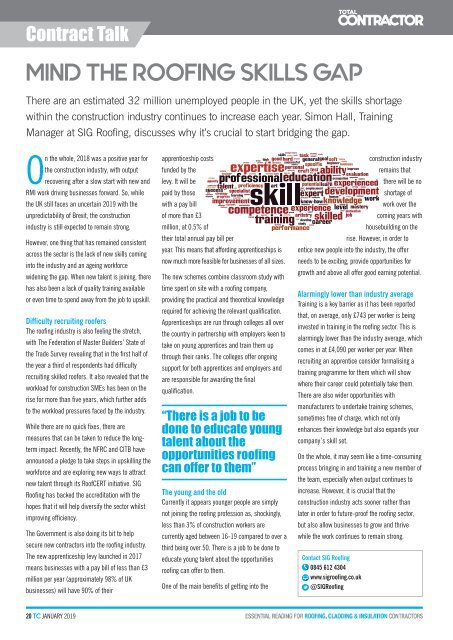January 2019
You also want an ePaper? Increase the reach of your titles
YUMPU automatically turns print PDFs into web optimized ePapers that Google loves.
Contract Talk<br />
MIND THE ROOFING SKILLS GAP<br />
There are an estimated 32 million unemployed people in the UK, yet the skills shortage<br />
within the construction industry continues to increase each year. Simon Hall, Training<br />
Manager at SIG Roofing, discusses why it’s crucial to start bridging the gap.<br />
On the whole, 2018 was a positive year for<br />
the construction industry, with output<br />
recovering after a slow start with new and<br />
RMI work driving businesses forward. So, while<br />
the UK still faces an uncertain <strong>2019</strong> with the<br />
unpredictability of Brexit, the construction<br />
industry is still expected to remain strong.<br />
However, one thing that has remained consistent<br />
across the sector is the lack of new skills coming<br />
into the industry and an ageing workforce<br />
widening the gap. When new talent is joining, there<br />
has also been a lack of quality training available<br />
or even time to spend away from the job to upskill.<br />
Difficulty recruiting roofers<br />
The roofing industry is also feeling the stretch,<br />
with The Federation of Master Builders’ State of<br />
the Trade Survey revealing that in the first half of<br />
the year a third of respondents had difficulty<br />
recruiting skilled roofers. It also revealed that the<br />
workload for construction SMEs has been on the<br />
rise for more than five years, which further adds<br />
to the workload pressures faced by the industry.<br />
While there are no quick fixes, there are<br />
measures that can be taken to reduce the longterm<br />
impact. Recently, the NFRC and CITB have<br />
announced a pledge to take steps in upskilling the<br />
workforce and are exploring new ways to attract<br />
new talent through its RoofCERT initiative. SIG<br />
Roofing has backed the accreditation with the<br />
hopes that it will help diversify the sector whilst<br />
improving efficiency.<br />
The Government is also doing its bit to help<br />
secure new contractors into the roofing industry.<br />
The new apprenticeship levy launched in 2017<br />
means businesses with a pay bill of less than £3<br />
million per year (approximately 98% of UK<br />
businesses) will have 90% of their<br />
apprenticeship costs<br />
funded by the<br />
levy. It will be<br />
paid by those<br />
with a pay bill<br />
of more than £3<br />
million, at 0.5% of<br />
their total annual pay bill per<br />
year. This means that affording apprenticeships is<br />
now much more feasible for businesses of all sizes.<br />
The new schemes combine classroom study with<br />
time spent on site with a roofing company,<br />
providing the practical and theoretical knowledge<br />
required for achieving the relevant qualification.<br />
Apprenticeships are run through colleges all over<br />
the country in partnership with employers keen to<br />
take on young apprentices and train them up<br />
through their ranks. The colleges offer ongoing<br />
support for both apprentices and employers and<br />
are responsible for awarding the final<br />
qualification.<br />
“There is a job to be<br />
done to educate young<br />
talent about the<br />
opportunities roofing<br />
can offer to them”<br />
The young and the old<br />
Currently it appears younger people are simply<br />
not joining the roofing profession as, shockingly,<br />
less than 3% of construction workers are<br />
currently aged between 16-19 compared to over a<br />
third being over 50. There is a job to be done to<br />
educate young talent about the opportunities<br />
roofing can offer to them.<br />
One of the main benefits of getting into the<br />
construction industry<br />
remains that<br />
there will be no<br />
shortage of<br />
work over the<br />
coming years with<br />
housebuilding on the<br />
rise. However, in order to<br />
entice new people into the industry, the offer<br />
needs to be exciting, provide opportunities for<br />
growth and above all offer good earning potential.<br />
Alarmingly lower than industry average<br />
Training is a key barrier as it has been reported<br />
that, on average, only £743 per worker is being<br />
invested in training in the roofing sector. This is<br />
alarmingly lower than the industry average, which<br />
comes in at £4,090 per worker per year. When<br />
recruiting an apprentice consider formalising a<br />
training programme for them which will show<br />
where their career could potentially take them.<br />
There are also wider opportunities with<br />
manufacturers to undertake training schemes,<br />
sometimes free of charge, which not only<br />
enhances their knowledge but also expands your<br />
company’s skill set.<br />
On the whole, it may seem like a time-consuming<br />
process bringing in and training a new member of<br />
the team, especially when output continues to<br />
increase. However, it is crucial that the<br />
construction industry acts sooner rather than<br />
later in order to future-proof the roofing sector,<br />
but also allow businesses to grow and thrive<br />
while the work continues to remain strong.<br />
Contact SIG Roofing<br />
0845 612 4304<br />
www.sigroofing.co.uk<br />
@SIGRoofing<br />
20 TC JANUARY <strong>2019</strong>

















